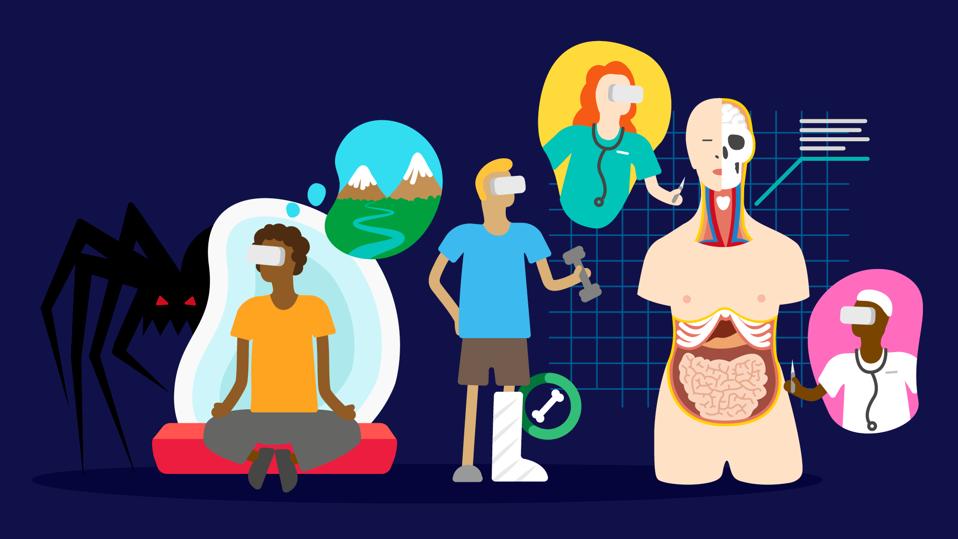THE GROWING VALUE OF XR IN HEALTHCARE IN THE UNITED KINGDOM
designed and illustrated by https://ift.tt/3oDyj0R
This week a report launched in the UK outlining the opportunities of using XR in Health. XR refers to Extended Reality and covers Augmented Reality (AR), Mixed Reality (MR) and Virtual Reality (VR), haptics, interfaces, platforms and software and is often referred to as immersive technologies.
There’s additional importance attached to this report because it was carried out in partnership with the NHS. It gives us plenty of insight into what the future of a technology-enabled NHS healthcare system could look like and sketches out ways in which immersive technologies could help drive a more effective service not to mention, a more financially-efficient one.
Interestingly, the project came about after Ben Williams from Care City London wrote a Tweet about the BBC closing down their VR labs and the opportunities for sharing that knowledge with the NHS. It was spotted by Ross O’Brien who works in the NHS, and he and his two co-authors then embarked on research, consultations with startups, designers, healthcare professionals and other researchers to explore the challenges and opportunities for the creation and distribution of XR in health. The premise being that this could be a major means of driving additional value for money in the NHS.
The report delves into use cases of XR in healthcare across a number of key application areas, including mental health and wellbeing, physiotherapy and rehabilitation, pain management, healthcare professional clinical skills training and patient education. Stand out examples included OxfordVR’s interventions that provide safe and controlled environments in which people with psychoses can learn to overcome their anxiety, guided by a virtual coach, as well as the use of VR in home care settings which includes helping those with loneliness that often leads to cognitive decline. It covers a 2020 study that employed VR as a tool for reminisce therapy, enabling people to return to places of significance, providing relaxing and entertaining experiences that could engage those who were too frail or unable to travel. Additionally, the opportunity to bring VR to palliative care settings is shown to have extremely positive results.
MORE FOR YOU
Dealing with pain management is another focus, and one particular case study explored how VR could help burn patients tolerate pain throughout repetitive and painful treatments, such as wound debridement, dressing changes and other painful medical procedures. But a very future-focused application is also social prescribing, which enables GPs, nurses and other primary care professionals to refer people to a range of services to support their health and wellbeing. One of the authors of the report, Sarah Ticho, suggested cross-sector collaboration with entertainment in this area could be key, saying “I think there are really interesting opportunities to collaborate with the entertainment and games sector using existing entertainment-based experiences, to help create new experiences, that could be used as tools for preventative care.”
As the report’s title suggests, the main focus is on the potential savings that could be accrued by adopting some of these technologies and transferring them into the NHS. One of the many sobering stats showed that £400 million a year can be the cost of lost operating theatre time, and that £2m could be saved by utilising the benefits of XR by saving some patients from needless operations or treatments that XR could deliver instead.
But as Fiona Kilkelly, the third of the co-authors, pointed out to me when we spoke, none of this will manifest if the many and varied entities across the research, innovation and industry eco-system, don’t join the dots and collaborate to deliver these solutions. This area has high-growth potential but it won’t be realised if the enthusiasm and expertise across the NHS, industry and academia aren’t better connected. She said, “The UK has leading edge ideas in healthcare research but it’s a struggle to get access to the technologists to create and make experiences on the back of their research.”
The report does indeed set out the opportunities of a cross-sector approach. Fiona can see see the opportunity for XR to add a huge amount of value in healthcare, “…its ripe and ready for development but it’s a fragmented space. The NHS can see the cost savings and efficiencies that can be driven and the improved patient journeys and patient outcomes with XR, so the question is how do you enable our XR producers, particularly those in the creative and digital space – games creative and digital XR companies – to connect with this opportunity and open up new markets?”
The report offers tangible evidence and data to support the economic opportunities for XR in health, and the authors now intend to work with a range of stakeholders across games, tech, health and research to co-create new models and ways of working. The key priority seems to be the mapping of the UK XR health sector, then the development of centres of excellence that will drive new funding initiatives and finally the designing of models for creating, scaling and distributing solutions.
In essence this report shows the enormous value of connecting the XR health ecosystem if it’s to deliver value for money for the NHS.
from WordPress https://ift.tt/3f66qva
via IFTTT







No comments:
Post a Comment